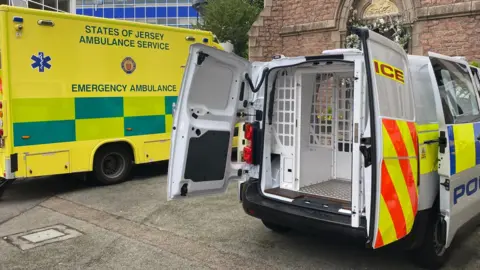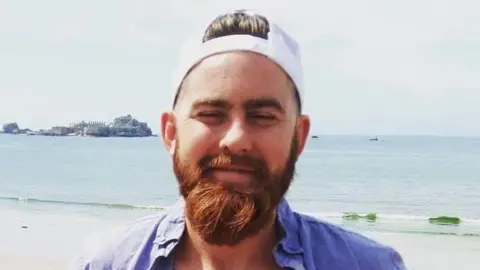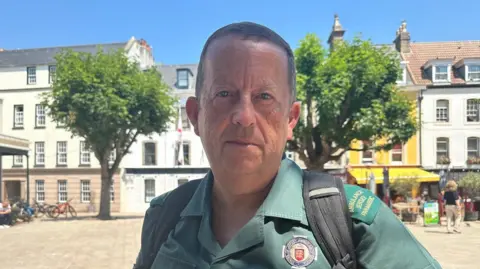Ambulance calls to police 'not safe' coroner says
 BBC
BBCA coroner has criticised the lack of communication between Jersey's emergency services following the death of a man.
At the inquest of Frazer Irvine, 39, who died of a heart attack on 18 March 2022 while ambulance workers and police officers were at his home, Bridget Dolan KC said it was hard to see how lessons could be learnt from his death without a relevant policy on ambulance staff calling for police assistance.
The inquest also heard from paramedic John Sutherland who said he and his colleague may have treated Mr Irvine differently if there had not been a "huge delay" in the response to their calls for police assistance.
The inquest, expected to conclude on Friday, continues.
 Family handout
Family handoutMr Sutherland and ambulance technician Tom Le Sauteur were previously found guilty of failing to take reasonable care of Mr Irvine the night he died.
The paramedic told the hearing there were "absolutely" things he could have done better on the night, such as putting on personal protective equipment (PPE) earlier and using equipment to monitor Mr Irvine more closely.
Mr Sutherland said that Mr Irvine was aggressive when he and Mr Le Sauteur arrived at his home but the police did not respond to their first call for help, and had to be chased up with a second call.
He said concern for his and his colleague's safety and an inability to move Mr Irvine from the top of the staircase outside his flat meant they did not provide active medical care until the police arrived.

The inquest heard that Mr Sutherland and Mr Le Sauteur told emergency call handlers they needed police back up because of Mr Irvine's aggression but did not pass on information about the urgency of the situation, including the risks to them or the patient.
Ms Dolan identified that, at the time, there was no policy requiring them to do so nor a policy requiring the emergency call handlers to ask for this information.
She said if this information was not passed on to the police, the system was not safe.
Giving evidence at the hearing, Senior Ambulance Officer James Inglis admitted there was still no appropriate policy on this issue.
Ms Dolan challenged Mr Inglis on a draft policy on calls for police assistance, written by the ambulance service in May 2025.
She said it still did not require ambulance staff requesting police back up to pass on essential information or require emergency call handlers to ask for it.
Mr Inglis told the hearing he would review the policy and deal with some of the issues within it.
'Against clinical practice'
Mr Sutherland was also questioned on why he and his colleagues stopped Mr Irvine's cardiopulmonary resuscitation (CPR) after 20 minutes, despite guidelines stating it should be continued for longer in the case of a suspected overdose.
Mr Sutherland said he and his ambulance colleagues determined it was "futile" to continue the CPR beyond 20 minutes, as they would have had to stop compressions for several minutes to get Mr Irvine down the stairs to where the ambulance was.
Mr Inglis told the hearing the decision to stop CPR after 20 minutes was not in accordance with the clinical practice or guidelines at time, adding he would have expected the crew to make an effort to get Mr Irvine to hospital.
The inquest continues.
Follow BBC Jersey on X and Facebook. Send your story ideas to [email protected].
